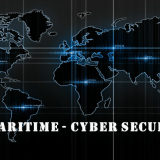November 29, 2021 MARITIME CYBER SECURITY
The programme consists of integrated workshops and tailored support aimed at helping IMO Member States to develop National Maritime Security Committees, Risk Registers and Strategies.
Peter Adams, IMO Special Advisor to the Secretary-General on maritime security, explains: “At IMO, we believe that an inclusive approach that draws key stakeholders together is most likely to yield meaningful results. Therefore, the programme aims to create a cross-government committee that can be aided by the Risk Register to objectively identify security gaps and prioritize where to steer future policy development, funding and capacity building efforts. It also leads to the development of a National Maritime Security Strategy that provide the strategic objectives, which explain how the Member State will secure its maritime domain for the foreseeable future. We hope to replicate the IMO Whole of Government Approach to Maritime Security in other regions in the future.”
The programme has been carefully designed based on IMO’s global maritime security experience, including assisting countries to implement IMO’s maritime security measures, such as the International Ship and Port Facility Security (ISPS) Code. The programme provides a practical framework to underpin effective national maritime security decision making and governance, tailored to the specific needs of the respective Member State. Each element can be delivered either as a stand-alone unit or as an integrated programme. Depending upon the option(s) chosen, the programme timeline can range from three to eighteen months.
Subject to available funding, IMO will work with the member state to provide the framework, expert workshops and consultancy support. IMO will be supporting Nigeria in the development of its National Maritime Security Strategy, with the project due to be launched towards the end of 2021 and completed within an 18month period.
Safer waters in West Africa
During a recent visit (22 October) to IMO Headquarters by representatives from the Nigerian Maritime Administration and Safety Agency (NIMASA), IMO Secretary-General Kitack Lim was given an update on maritime security in Nigerian waters. Dr. Bashir Jamoh, NIMASA Director General quoted data from the IMB reports, which demonstrate a downward trend, with a 40% reduction of piracy and armed robbery related incidents across the Gulf of Guinea. He stated that there were 28 incidents reported in the first three quarters of this year, compared to 46 in 2020. Nigeria accounted for four of these incidents, a 77% reduction from the 17 incidents in the same period in 2020. Unlike last year, when most incidents took place outside territorial waters, almost all incidents mentioned above occurred in anchorages, ports and harbours.
Dr. Jamoh attributed the significant reduction in maritime security incidents in Nigeria to deterrence, through increased maritime law enforcement presence in the estuary regions, and to enhanced intelligence and engagement with the people of the Niger Delta. He also outlined a plan to enhance security in internal waters, given recent incidents in those areas.
Emphasizing the value of IMO support for regional initiatives, the NIMASA Director General stated that the safety agency will shortly be completing work on its enhanced Regional Maritime Training centre in Lagos, which is expected to serve as a hub for regional Search and Rescue (SAR) and security training. This is expected to build on ongoing regional cooperation with the Maritime Organization for West and Central Africa (MOWCA) and the Joint Industry Group (Nigeria and international maritime industry associations). Dr. Jamoh also highlighted the efforts put in to enhance the region’s legal framework with adoption of legislation providing for enforcement and sanctions for offences against maritime security, including piracy.
NIMASA has been working to address socio-economic factors that contribute to piracy and maritime security issues, such as unemployment, poverty, lack of education opportunities, etc. There has been a positive impact from an ongoing maritime education programme to provide alternate employment opportunities and scholarships for youth in the affected areas. By training these individuals as future seafarers, fishers, maritime personnel and marine litter marshals, the programme creates economic opportunities as well as addresses the maritime skills gap.
Source: channel16.dryadglobal



